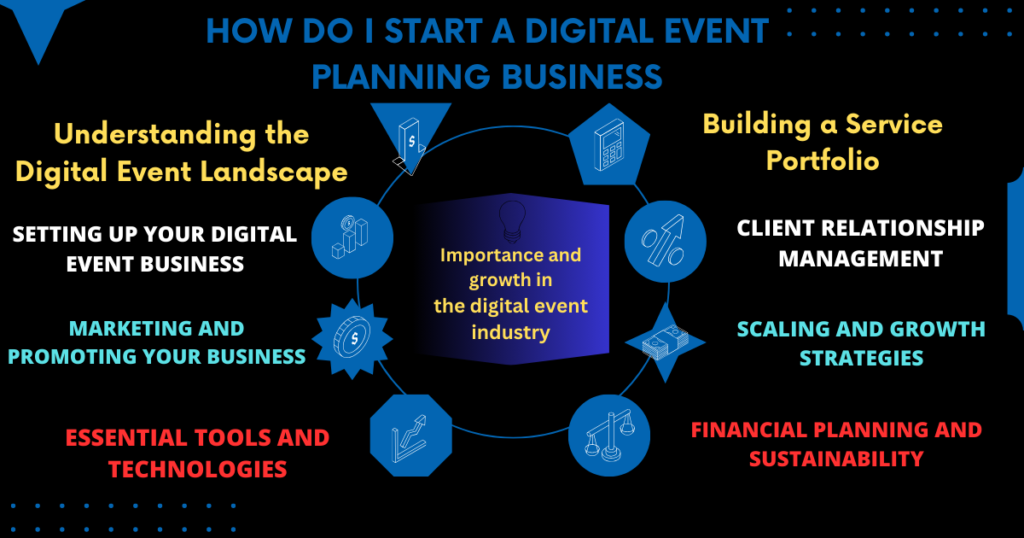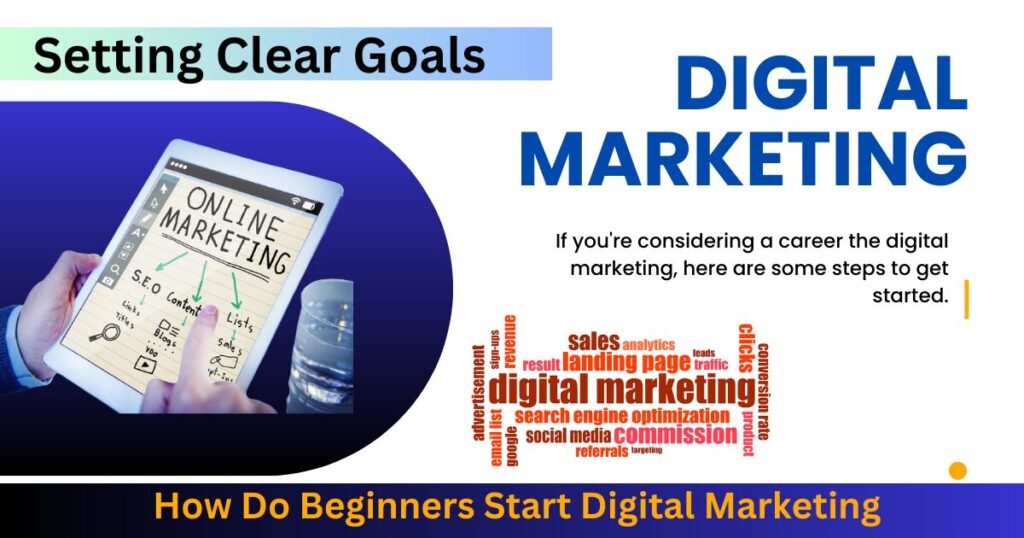Digital Event Planning Business:
1. Introduction
A passionate digital entrepreneur exploring event planning, technology, and online earning. Focused on creativity, growth, and empowering others with practical strategies to succeed in today’s fast-changing digital business world.
Definition of Digital Event Planning
Digital event planning is all about strategizing, organizing, and bringing to life events in the online world. This process covers a broad range of activities, from the initial concept to seamless execution.
Importance and Growth in the Digital Event Industry
The digital event industry has experienced remarkable growth, thanks to its affordability, widespread accessibility, and adaptability. As companies increasingly embrace virtual environments, the need for expertly organized digital events keeps rising.

2. Understanding the Digital Event Landscape
Present-Day Developments in Digital Events
Recent technological advancements are revolutionizing the way we host events. We’re now seeing exciting new formats emerge, like virtual reality (VR) events, hybrid gatherings that seamlessly blend online and offline experiences, and engaging interactive webinars. By staying ahead of these trends, we can create truly unique and memorable event experiences.
Identifying niche markets and target audiences
Recognizing particular niches and grasping the preferences of your target audience are essential steps. By customizing events to align with niche interests, you can achieve greater engagement and enhance client satisfaction.
Researching Competitors
Examining what your competitors are doing can uncover opportunities in the market and help you create strategies that set your services apart. This process gives you a clearer view of effective approaches and highlights areas where you can enhance your own offerings.
3. Setting Up Your Digital Event Business
Crafting a Business Plan
The foundation of any successful venture lies in a well-defined business plan. It’s essential to clearly outline your target market, revenue streams, business goals, and marketing strategies.
Legal Considerations and Registrations
Navigating legal aspects is pivotal. To set your business up for success, it’s essential to register properly, secure the required licenses, and familiarize yourself with compliance standards. This approach will help pave the way for a seamless operational experience.
Building a Strong Brand Identity
Crafting a compelling brand identity sets you apart. “To build a strong brand, we need to design a logo, outline our core values, and maintain a consistent voice in all our communications.”
4. Essential Tools and Technologies
Software and Platforms for Event Management
Make sure to leverage dedicated software and platforms designed specifically for managing events. Essential tools for registration, ticketing, engaging attendees, and live streaming are key to ensuring everything runs smoothly.
Marketing Tools and Strategies
Harness digital marketing tools such as social media, SEO, and email campaigns to connect with your target audience effectively. Compelling content coupled with well-planned campaigns will enhance your visibility.
Budgeting and Financial Management Tools
Efficient financial management is key. Implementing effective budgeting tools and strategies to monitor expenses, oversee cash flow, and maintain profitability is crucial for achieving sustainable growth.
5. Building a Service Portfolio
Types of Digital Events to Offer
Discover a range of event formats, including webinars, virtual trade shows, product launches, and beyond. By customizing your services to meet the unique needs of different clients, you can enhance your appeal in the marketplace.
Creating Customizable Packages for Clients
Providing customizable packages allows for greater flexibility. Clients appreciate tailored solutions that meet the specific requirements of their events.
Implementing Innovative Ideas and Concepts
Embracing innovation is what distinguishes your business from the competition. By integrating fresh ideas and cutting-edge technologies, you ensure that your events remain captivating and unforgettable.
6. Marketing and Promoting Your Business
1. Developing a Robust Online Presence
Leverage social media platforms alongside your business website. By maintaining a consistent brand image and sharing engaging content, you’ll boost your visibility and establish credibility in your market.
2. Utilizing Social Media and Digital Marketing Strategies
Maximize your outreach by leveraging social media. Connect with potential clients through captivating content, live sessions, and engaging posts.
3. Networking and Partnerships
Forge partnerships within the industry. By partnering with vendors, influencers, and businesses that complement your own, you can broaden your network and reach a wider audience of potential clients.
7. Client Relationship Management
Effective Communication Strategies
Clear and prompt communication is vital. Creating clear communication channels is essential for fostering smooth interactions with clients during the planning process.
Providing Exceptional Customer Service
Deliver exceptional service to clients. Respond to their needs quickly, provide effective solutions, and create a smooth experience to build lasting relationships.
Obtaining and Leveraging Client Feedback
Feedback is invaluable. “After the event, gather feedback to enhance our services.”Positive testimonials also serve as powerful marketing tools.
8. Scaling and Growth Strategies
Scaling Your Business Operations
As demand grows, scale operations efficiently. Bringing on new team members, optimizing our procedures, and broadening our offerings drive our growth forward.
Expanding Service Offerings
To stay ahead of changing client needs, it’s essential to broaden your service offerings. By introducing innovative event formats or unique specialized services, you can maintain your competitive edge in the market.
Staying Updated with Industry Trends
Constantly evolving is key. Keep yourself informed about the latest industry trends, tech innovations, and new event formats to ensure you stay relevant.
9. Financial Planning and Sustainability
1. Managing Finances and Cash Flow
Maintain a robust financial strategy. Keep a close eye on your cash flow, carefully manage your expenses, and allocate resources thoughtfully to ensure long-term growth.
2. Strategies for Profitability and Sustainability
Implement strategies to ensure profitability. This could include refining pricing strategies and pinpointing areas where expenses can be reduced.
3. Investing in Growth and Innovation
Allocate resources towards innovation. Embracing new technologies and nurturing talent drive innovation, ensuring your business stays at the forefront of the industry.
10. Conclusion
Starting a digital event planning business takes dedication, creativity, and a well-thought-out strategy. By adhering to these steps and remaining adaptable to market changes, you can establish a successful venture in the thriving digital event industry.
FAQ
Question 1. How to start an event planning business with no experience?
ANS. Begin with small steps, acquire skills through online resources, take advantage of free tools, volunteer to gain experience, expand your network, create a portfolio, and advance your career gradually.
Question 2. How do event planners make money?
ANS. Event planners generate revenue through various avenues, including service fees, commissions, strategic partnerships with vendors, consultation services, ticket sales, bundled package deals, and effective budget management.
Question 3. How can I be an event planner without a degree?
ANS. Get involved by volunteering to gain valuable experience, develop strong organizational skills, and take advantage of online courses. Connect with professionals in your field, showcase your work in a portfolio, and confidently promote your services
Question 4. How to start an event planner business with no money?
ANS. Begin by utilizing free tools to kickstart your journey. Offer your services to the local community and seek collaborations with vendors. Volunteer your skills for greater exposure and focus on building a solid portfolio. Leverage social media to showcase your work and gradually expand your reach over time.





.jpg)
